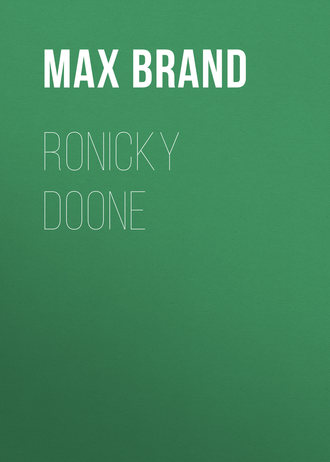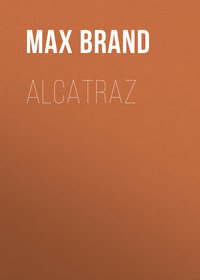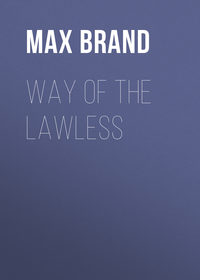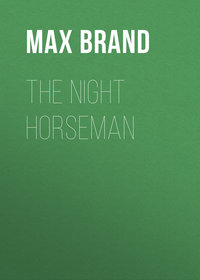 полная версия
полная версияRonicky Doone
It was in an alcove, apart from the sweep of big rooms which were given over to the players. It lay, too, conveniently in range of the beat of Frederic Fernand, as he moved slowly back and forth, over a limited territory and stopped, here and there for a word, here and there for a smile. He was smoothing the way for dollars to slide out of wallets. Now he deliberately stopped the party in their progress to the alcove.
"I have to meet you," he said to Ronicky. "You remind me of a friend of my father, a young Westerner, those many years ago. Same brown skin, same clear eye. He was a card expert, the man I'm thinking about. I hope you're not in the same class, my friend!"
Then he went on, laughing thunderously at his own poor jest. Particularly from the back, as he retreated, he seemed a harmless fat man, very simple, very naive. But Ronicky Doone regarded him with an interest both cold and keen. And, with much the same regard, after Fernand had passed out of view, the Westerner regarded the table at which they were to sit.
In the alcove were three wall lights, giving an ample illumination—too ample to suit Ronicky Doone. For McKeever had taken the chair with the back to the light. He made no comment, but, taking the chair which was facing the lights, the chair which had been pointed out to him by McKeever, he drew it around on the far side and sat down next to the professional gambler.
Chapter Nineteen
Stacked Cards
The game opened slowly. The first, second, and third hands were won by Jerry Smith. He tucked away his chips with a smile of satisfaction, as if the three hands were significant of the whole progress of the game. But Ronicky Doone pocketed his losses without either smile or sneer. He had played too often in games in the West which ran to huge prices. Miners had come in with their belts loaded with dust, eager to bet the entire sum of their winnings at once. Ranchers, fat with the profits of a good sale of cattle, had wagered the whole amount of it in a single evening. As far as large losses and large gains were concerned, Ronicky Doone was ready to handle the bets of anyone, other than millionaires, without a smile or a wince.
The trouble with McKeever was that he was playing the game too closely. Long before, it had been a maxim with the chief that a good gambler should only lose by a small margin. That maxim McKeever, playing for the first time for what he felt were important stakes in the eyes of Fernand, followed too closely. Stacking the cards, with the adeptness which years of practice had given to him, he never raised the amount of his opponent's hand beyond its own order. A pair was beaten by a pair, three of a kind was simply beaten by three of a kind of a higher order; and, when a full house was permitted by his expert dealing to appear to excite the other gamblers, he himself indulged in no more than a superior grade of three of a kind.
Half a dozen times these coincidences happened without calling for any distrust on the part of Ronicky Doone, but eventually he began to think. Steady training enabled his eyes to do what the eyes of the ordinary man could not achieve, and, while to Jerry Smith all that happened in the deals of McKeever was the height of correctness, Ronicky Doone, at the seventh deal, awakened to the fact that something was wrong.
He hardly dared to allow himself to think of anything for a time, but waited and watched, hoping against hope that Jerry Smith himself would discover the fraud which was being perpetrated on them. But Jerry Smith maintained a bland interest in the game. He had won between two and three hundred, and these winnings had been allowed by McKeever to accumulate in little runs, here and there. For nothing encourages a gambler toward reckless betting so much as a few series of high hands. He then begins to believe that he can tell, by some mysterious feeling inside, that one good hand presages another. Jerry Smith had not been brought to the point where he was willing to plunge, but he was very close to it.
McKeever was gathering the youngster in the hollow of his hand, and Ronicky Doone, fully awake and aware of all that was happening, felt a gathering rage accumulate in him. There was something doubly horrible in this cheating in this place. Ronicky set his teeth and watched. Plainly he was the chosen victim. The winnings of Jerry Smith were carefully balanced against the losses of Ronicky Doone. Hatred for this smooth-faced McKeever was waxing in him, and hatred in Ronicky Doone meant battle.
An interruption came to him from the side. It came in the form of a brief rustling of silk, like the stir of wind, and then Ruth Tolliver's coppery hair and green-blue eyes were before him—Ruth Tolliver in an evening gown and wonderful to look at. Ronicky Doone indulged himself with staring eyes, as he rose to greet her. This, then, was her chosen work under the régime of John Mark. It was as a gambler that she was great. The uneasy fire was in her eyes, the same fire that he had seen in Western gold camps, in Western gaming houses. And the delicate, nervous fingers now took on a new meaning to him.
That she had won heavily this evening he saw at once. The dangerous and impalpable flush of the gamester was on her face, and behind it burned a glow and radiance. She looked as if, having defeated men by the coolness of her wits and the favor of luck, she had begun to think that she could now outguess the world. Two men trailed behind her, stirring uneasily about when she paused at Ronicky's alcove table.
"You've found the place so soon?" she asked. "How is your luck?"
"Not nearly as good tonight as yours."
"Oh, I can't help winning. Every card I touch turns into gold this evening. I think I have the formula for it."
"Tell me, then," said Ronicky quickly enough, for there was just the shadow of a backward nod of her head.
"Just step aside. I'll spoil Mr. McKeever's game for him, I'm afraid."
Ronicky excused himself with a nod to the other two and followed the girl into the next room.
"I have bad news," she whispered instantly, "but keep smiling. Laugh if you can. The two men with me I don't know. They may be his spies for all we can tell. Ronicky Doone, John Mark is out for you. Why, in Heaven's name, are you interfering with Caroline Smith and her affairs? It will be your death, I promise you. John Mark has arrived and has placed men around the house. Ronicky Doone, he means business. Help yourself if you can. I'm unable to lift a hand for you. If I were you I should leave, and I should leave at once. Laugh, Ronicky Doone!"
He obeyed, laughing until the tears were glittering in his eyes, until the girl laughed with him.
"Good!" she whispered. "Good-by, Ronicky, and good luck."
He watched her going, saw the smiles of the two men, as they greeted her again and closed in beside her, and watched the light flash on her shoulders, as she shrugged away some shadow from her mind—perhaps the small care she had given about him. But no matter how cold-hearted she might be, how thoroughly in tune with this hard, bright world of New York, she at least was generous and had courage. Who could tell how much she risked by giving him that warning?
Ronicky went back to his place at the table, still laughing in apparent enjoyment of the jest he had just heard. He saw McKeever's ferretlike glance of interrogation and distrust—a thief's distrust of an honest man—but Ronicky's good nature did not falter in outward seeming for an instant. He swept up his hand, bet a hundred, with apparently foolish recklessness, on three sevens, and then had to buy fresh chips from McKeever.
The coming of the girl seemed to have completely upset his equilibrium as a gambler—certainly it made him bet with the recklessness of a madman. And Frederic Fernand, glancing in from time to time, watched the demolition of Ronicky's pile of chips, with growing complacence.
Ronicky Doone had allowed himself to take heed of the room about him, and Frederic Fernand liked him for it. His beautiful rooms were pearls cast before swine, so far as most of his visitors were concerned. A moment later Ronicky had risen, went toward the wall and drew a dagger from its sheath.
It was a full twelve inches in length, that blade, and it came to a point drawn out thinner than the eye could follow. The end was merely a long glint of light. As for Ronicky Doone, he cried out in surprise and then sat down, balancing the weapon in his hand and looking down at it, with the silent happiness of a child with a satisfying toy.
Frederic Fernand was observing him. There was something remarkably likable in young Doone, he decided. No matter what John Mark had said—no matter if John Mark was a genius in reading the characters of men—every genius could make mistakes. This, no doubt, was one of John Mark's mistakes. There was the free and careless thoughtlessness of a boy about this young fellow. And, though he glanced down the glimmering blade of the weapon, with a sort of sinister joy, Frederic Fernand did not greatly care. There was more to admire in the workmanship of the hilt than in a thousand such blades, but a Westerner would have his eye on the useful part of a thing.
"How much d'you think that's worth?" asked McKeever.
"Dunno," said Ronicky. "That's good steel."
He tried the point, then he snapped it under his thumb nail and a little shiver of a ringing sound reached as far as Frederic Fernand.
Then he saw Ronicky Doone suddenly lean a little across the table, pointing toward the hand in which McKeever held the pack, ready for the deal.
McKeever shook his head and gripped the pack more closely.
"Do you suspect me of crooked work?" asked McKeever. He pushed back his chair. Fernand, studying his lieutenant in this crisis, approved of him thoroughly. He himself was in a quandary. Westerners fight, and a fight would be most embarrassing. "Do you think—" began McKeever.
"I think you'll keep that hand and that same pack of cards on the table till I've had it looked over," said Ronicky Doone. "I've dropped a cold thousand to you, and you're winning it with stacked decks, McKeever."
There was a stifled oath from McKeever, as he jerked his hand back. Frederic Fernand was beginning to draw one breath of joy at the thought that McKeever would escape without having that pack, of all packs, examined, when the long dagger flashed in the hand of Ronicky Doone.
He struck as a cat strikes when it hooks the fish out of the stream—he struck as the snapper on the end of a whiplash doubles back. And well and truly did that steel uphold its fame.
The dull, chopping sound of the blow stood by itself for an instant. Then McKeever, looking down in horror at his hand, screamed and fell back in his chair.
That was the instant when Frederic Fernand judged his lieutenant and found him wanting. A man who fainted in such a crisis as this was beyond the pale.
Other people crowded past him. Frightened, desperate, he pushed on. At length his weight enabled him to squeeze through the rapidly gathering crowd of gamblers.
The only nonchalant man of the lot was he who had actually used the weapon. For Ronicky Doone stood with his shoulders propped against the wall, his hands clasped lightly behind him. For all that, it was plain that he was not unarmed. A certain calm insolence about his expression told Frederic Fernand that the teeth of the dragon were not drawn.
"Gents," he was saying, in his mild voice, while his eyes ran restlessly from face to face, "I sure do hate to bust up a nice little party like this one has been, but I figure them cards are stacked. I got a pile of reasons for knowing, and I want somebody to look over them cards—somebody that knows stacked cards when he sees 'em. Mostly it ain't hard to get onto the order of them being run up. I'll leave it, gents, to the man that runs this dump."
And, leaning across the table, he pushed the pack straight to Frederic Fernand. The latter set his teeth. It was very cunningly done to trap him. If he said the cards were straight they might be examined afterward; and, if he were discovered in a lie, it would mean more than the loss of McKeever—it would mean the ruin of everything. Did he dare take the chance? Must he give up McKeever? The work of years of careful education had been squandered on McKeever.
Fernand looked up, and his eyes rested on the calm face of Ronicky Doone. Why had he never met a man like that before? There was an assistant! There was a fellow with steel-cold nerve—worth a thousand trained McKeevers! Then he glanced at the wounded man, cowering and bunched in his chair. At that moment the gambler made up his mind to play the game in the big way and pocket his losses.
"Ladies and gentlemen," he said sadly, placing the cards back on the edge of the table, "I am sorry to say that Mr. Doone is right. The pack has been run up. There it is for any of you to examine it. I don't pretend to understand. Most of you know that McKeever has been with me for years. Needless to say, he will be with me no more." And, turning on his heel, the old fellow walked slowly away, his hands clasped behind him, his head bowed.
And the crowd poured after him to shake his hand and tell him of their unshakable confidence in his honesty. McKeever was ruined, but the house of Frederic Fernand was more firmly established than ever, after the trial of the night.
Chapter Twenty
Trapped!
"Get the money," said Ronicky to Jerry Smith.
"There it is!"
He pointed to the drawer, where McKeever, as banker, had kept the money. The wounded man in the meantime had disappeared.
"How much is ours?" asked Jerry Smith.
"All you find there," answered Ronicky calmly.
"But there's a big bunch—large bills, too. McKeever was loaded for bear."
"He loses—the house loses it. Out in my country, Jerry, that wouldn't be half of what the house would lose for a little trick like what's been played on us tonight. Not the half of what the house would lose, I tell you! He had us trimmed, Jerry, and out West we'd wreck this joint from head to heels."
The diffident Jerry fingered the money in the drawer of the table uncertainly. Ronicky Doone swept it up and thrust it into his pocket. "We'll split straws later," said Ronicky. "Main thing we need right about now is action. This coin will start us."
In the hall, as they took their hats, they found big Frederic Fernand in the act of dissuading several of his clients from leaving. The incident of the evening was regrettable, most regrettable, but such things would happen when wild men appeared. Besides, the fault had been that of McKeever. He assured them that McKeever would never again be employed in his house. And Fernand meant it. He had discarded all care for the wounded man.
Ronicky Doone stepped to him and drew him aside. "Mr. Fernand," he said, "I've got to have a couple of words with you."
"Come into my private room," said Fernand, eager to get the fighter out of view of the rest of the little crowd. He drew Ronicky and Jerry Smith into a little apartment which opened off the hall. It was furnished with an almost feminine delicacy of style, with wide-seated, spindle-legged Louis XV. chairs and a couch covered with rich brocade. The desk was a work of Boulle. A small tapestry of the Gobelins made a ragged glow of color on the wall. Frederic Fernand had recreated an atmosphere two hundred years old.
He seated them at once. "And now, sir," he said sternly to Ronicky Doone, "you are aware that I could have placed you in the hands of the police for what you've done tonight?"
Ronicky Doone made no answer. His only retort was a gradually spreading smile. "Partner," he said at length, while Fernand was flushing with anger at this nonchalance on the part of the Westerner, "they might of grabbed me, but they would have grabbed your house first."
"That fact," said Fernand hotly, "is the reason you have dared to act like a wild man in my place? Mr. Doone, this is your last visit."
"It sure is," said Ronicky heartily. "D'you know what would have happened out in my neck of the woods, if there had been a game like the one tonight? I wouldn't have waited to be polite, but just pulled a gat and started smashing things for luck."
"The incident is closed," Fernand said with gravity, and he leaned forward, as if to rise.
"Not by a long sight," said Ronicky Doone. "I got an idea, partner, that you worked the whole deal. This is a square house, Fernand. Why was I picked out for the dirty work?"
It required all of Fernand's long habits of self control to keep him from gasping. He managed to look Ronicky Doone fairly in the eyes. What did the youngster know? What had he guessed?
"Suppose I get down to cases and name names? The gent that talked to you about me was John Mark. Am I right?" asked Ronicky.
"Sir," said Fernand, thinking that the world was tumbling about his ears, "what infernal—"
"I'm right," said Ronicky. "I can tell when I've hurt a gent by the way his face wrinkles up. I sure hurt you that time, Fernand. John Mark it was, eh?"
Fernand could merely stare. He began to have vague fears that this young devil might have hypnotic powers, or be in touch with he knew not what unearthly source of information.
"Out with it," said Ronicky, leaving his chair.
Frederic Fernand bit his lip in thought. He was by no means a coward, and two alternatives presented themselves to him. One was to say nothing and pretend absolute ignorance; the other was to drop his hand into his coat pocket and fire the little automatic which nestled there.
"Listen," said Ronicky Doone, "suppose I was to go a little farther still in my guesses! Suppose I said I figured out that John Mark and his men might be scattered around outside this house, waiting for me and Smith to come out: What would you say to that?"
"Nothing," said Fernand, but he blinked as he spoke. "For a feat of imagination as great as that I have only a silent admiration. But, if you have some insane idea that John Mark, a gentleman I know and respect greatly, is lurking like an assassin outside the doors of my house—"
"Or maybe inside 'em," said Ronicky, unabashed by this gravity.
"If you think that," went on the gambler heavily, "I can only keep silence. But, to ease your own mind, I'll show you a simple way out of the house—a perfectly safe way which even you cannot doubt will lead you out unharmed. Does that bring you what you want?"
"It sure does," said Ronicky. "Lead the way, captain, and you'll find us right at your heels." He fell in beside Jerry Smith, while the fat man led on as their guide.
"What does he mean by a safe exit?" asked Jerry Smith. "You'd think we were in a smuggler's cave."
"Worse," said Ronicky, "a pile worse, son. And they'll sure have to have some tunnels or something for get-aways. This ain't a lawful house, Jerry."
As they talked, they were being led down toward the cellar. They paused at last in a cool, big room, paved with cement, and the unmistakable scent of the underground was in the air.
"Here we are," said the fat man, and, so saying, he turned a switch which illumined the room completely and then drew aside a curtain which opened into a black cavity.
Ronicky Doone approached and peered into it. "How does it look to you, Jerry?" he asked.
"Dark, but good enough for me, if you're all set on leaving by some funny way."
"I don't care how it looks," said Ronicky thoughtfully. "By the looks you can't make out nothing most of the time—nothing important. But they's ways of smelling things, and the smell of this here tunnel ain't too good to me. Look again and try to pry down that tunnel with your flash light, Jerry."
Accordingly Jerry raised his little pocket electric torch and held it above his head. They saw a tunnel opening, with raw dirt walls and floor and a rude framing of heavy timbers to support the roof. But it turned an angle and went out of view in a very few paces.
"Go down there with your lantern and look for the exit," said Ronicky Doone. "I'll stay back here and see that we get our farewell all fixed up."
The damp cellar air seemed to affect the throat of the fat man. He coughed heavily.
"Say, Ronicky," said Jerry Smith, "looks to me that you're carrying this pretty far. Let's take a chance on what we've got ahead of us?"
The fat man was chuckling: "You show a touching trust in me, Mr. Doone."
Ronicky turned on him with an ugly sneer. "I don't like you, Fernand," he said. "They's nothing about you that looks good to me. If I knew half as much as I guess about you I'd blow your head off, and go on without ever thinking about you again. But I don't know. Here you've got me up against it. We're going to go down that tunnel; but, if it's blind, Fernand, and you trap us from this end, it will be the worst day of your life."
"Take this passage, Doone, or turn around and come back with me, and I'll show some other ways of getting out—ways that lie under the open sky, Doone. Would you like that better? Do you want starlight and John Mark—or a little stretch of darkness, all by yourself?" asked Fernand.
Ronicky Doone studied the face of Fernand, almost wistfully. The more he knew about the fellow the more thoroughly convinced he was that Fernand was bad in all possible ways. He might be telling the truth now, however—again he might be simply tempting him on to a danger. There was only one way to decide. Ronicky, a gambler himself, mentally flipped a coin and nodded to Jerry.
"We'll go in," he said, "but man, man, how my old scars are pricking!"
They walked into the moldy, damp air of the tunnel, reached the corner, and there the passage turned and ended in a blank wall of raw dirt, with a little apron of fallen debris at the bottom of it. Ronicky Doone walked first, and, when he saw the passage obstructed in this manner, he whirled like a flash and fired at the mouth of the tunnel.
A snarl and a curse told him that he had at least come close to his target, but he was too late. A great door was sliding rapidly across the width of the tunnel, and, before he could fire a second time, the tunnel was closed.
Jerry Smith went temporarily mad. He ran at the door, which had just closed, and struck the whole weight of his body against it. There was not so much as a quiver. The face of it was smooth steel, and there was probably a dense thickness of stonework on the other side, to match the cellar walls of the house.
"It was my fool fault," exclaimed Jerry, turning to his friend. "My fault, Ronicky! Oh, what a fool I am!"
"I should have known by the feel of the scars," said Ronicky. "Put out that flash light, Jerry. We may need that after a while, and the batteries won't last forever."
He sat down, as he spoke, cross-legged, and the last thing Jerry saw, as he snapped out the light, was the lean, intense face and the blazing eyes of Ronicky Doone. Decidedly this was not a fellow to trifle with. If he trembled for himself and Ronicky, he could also spare a shudder for what would happen to Frederic Fernand, if Ronicky got away. In the meantime the light was out, and the darkness sat heavily beside and about them, with that faint succession of inaudible breathing sounds which are sensed rather than actually heard.
"Is there anything that we can do?" asked Jerry suddenly. "It's all right to sit down and argue and worry, but isn't it foolish, Ronicky?"
"How come?"
"I mean it in this way. Sometimes when you can't solve a problem it's very easy to prove that it can't be solved by anyone. That's what I can prove now, but why waste time?"
"Have we got anything special to do with our time?" asked Ronicky dryly.
"Well, my proof is easy. Here we are in hard-pan dirt, without any sort of a tool for digging. So we sure can't tunnel out from the sides, can we?"
"Looks most like we can't," said Ronicky sadly.
"And the only ways that are left are the ends."
"That's right."
"But one end is the unfinished part of the tunnel; and, if you think we can do anything to the steel door—"
"Hush up," said Ronicky. "Besides, there ain't any use in you talking in a whisper, either. No, it sure don't look like we could do much to that door. Besides, even if we could, I don't think I'd go. I'd rather take a chance against starvation than another trip to fat Fernand's place. If I ever enter it again, son, you lay to it that he'll get me bumped off, mighty pronto."








